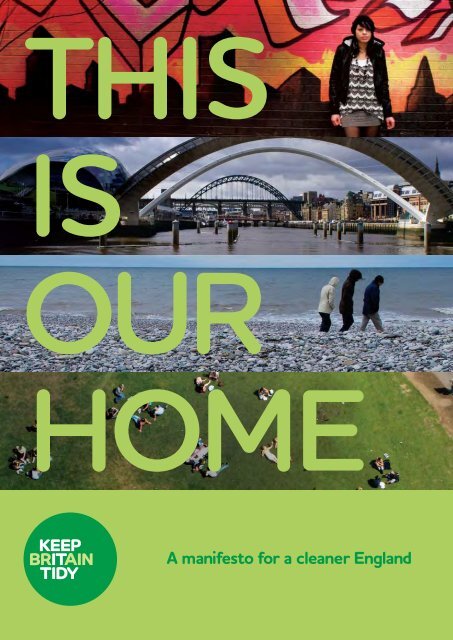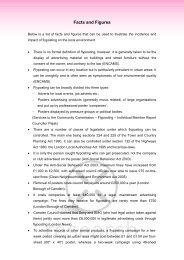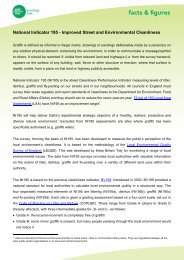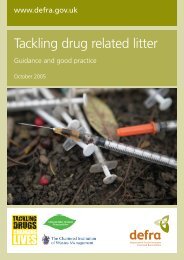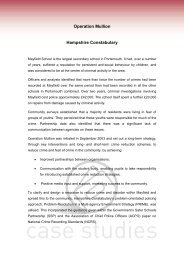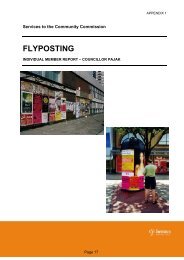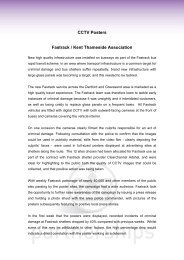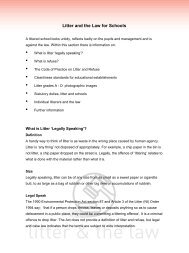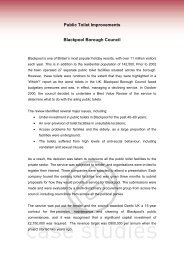This is our home - Keep Britain Tidy
This is our home - Keep Britain Tidy
This is our home - Keep Britain Tidy
Create successful ePaper yourself
Turn your PDF publications into a flip-book with our unique Google optimized e-Paper software.
THIS<br />
I S<br />
OUR<br />
HOME<br />
A manifesto for a cleaner England
Natalie Forrester & Ernie,<br />
London.<br />
Stanley & Millie,<br />
Filey Beach, Yorkshire.<br />
David Marsh,<br />
Rivelin Valley, Sheffield
A cleaner England<br />
We know that local people care deeply about the way their<br />
local environment looks, and it’s easy to understand why.<br />
Local environmental quality 1 affects us all as soon as we<br />
step out of <strong>our</strong> front doors – from litter on the street and<br />
graffiti on children’s play equipment, through to having safe<br />
access to parks and the freedom to walk and play.<br />
Local environmental quality <strong>is</strong> vitally important and underpins society as a whole.<br />
Its reach <strong>is</strong> vast – from improving wellbeing and health, reducing crime and ant<strong>is</strong>ocial<br />
behavi<strong>our</strong>, through to creating accessible green spaces, tackling climate change and<br />
contributing to a vibrant economy. What links these key <strong>is</strong>sues <strong>is</strong> a dependency on<br />
local neighb<strong>our</strong>hoods being clean, green, attractive and safe.<br />
In the past 20 years, there has been<br />
substantial progress in the way that local<br />
places are managed. Yet far too many of <strong>our</strong><br />
streets, towns and rural areas still continue<br />
to be blighted by litter, graffiti, fly-tipping<br />
and ant<strong>is</strong>ocial behavi<strong>our</strong>. <strong>Th<strong>is</strong></strong> leads to a<br />
lower quality of life for residents and hinders<br />
economic performance. We believe it <strong>is</strong> more<br />
cost effective to use public funds to tackle the<br />
causes rather than the symptoms of these<br />
problems. In 2007/8, the total street cleaning<br />
bill for England was over £780 million –<br />
enough to build almost three new hospitals<br />
or 30 new secondary schools. 3<br />
How the evidence adds up<br />
Our view <strong>is</strong> that only by working in<br />
partnership can we win the battle to create<br />
high-quality, well-managed neighb<strong>our</strong>hoods –<br />
respected and enjoyed by all. By creating<br />
and sustaining surroundings which local<br />
people are proud of, they will have the chance<br />
to thrive and <strong>our</strong> children will be better<br />
placed to grow up healthy, engaged members<br />
of society. We are calling for a combined<br />
effort over the next decade from a wide<br />
range of national and local organ<strong>is</strong>ations to<br />
turn around the state of <strong>our</strong> nation’s local<br />
environments in a concerted campaign for<br />
a cleaner England.<br />
We asked<br />
the general<br />
public<br />
to l<strong>is</strong>t their<br />
biggest<br />
concerns and<br />
63% of those<br />
interviewed<br />
named the<br />
appearance<br />
of their<br />
local area 2<br />
3<br />
Over the past year, we have evaluated the<br />
impact of local environmental quality policy<br />
and practice in its broadest form in England.<br />
We’ve looked back over the years since<br />
<strong>our</strong> founding in 1954 and particularly the<br />
last 20 years, following the introduction of<br />
the Environmental Protection Act 1990 and<br />
subsequent Clean Neighb<strong>our</strong>hoods and<br />
Environment Act 2005. We’ve also examined<br />
relevant evidence from abroad.<br />
Through <strong>our</strong> research, we’ve spoken<br />
with many individuals from a wide variety<br />
of organ<strong>is</strong>ations involved in delivering a<br />
cleaner, greener England. <strong>Th<strong>is</strong></strong> gave us<br />
the chance to engage with knowledgeable<br />
and concerned individuals at conferences,<br />
workshops and in d<strong>is</strong>cussion sessions. What’s<br />
more, <strong>our</strong> research team has undertaken<br />
a major review of the literature that covers<br />
local environmental <strong>is</strong>sues. The results are<br />
publ<strong>is</strong>hed in f<strong>our</strong> supporting evidence<br />
papers on <strong>our</strong> website at<br />
www.keepbritaintidy.org/<strong>our</strong><strong>home</strong><br />
These papers also contain more specific<br />
recommendations to support the challenges<br />
detailed in th<strong>is</strong> document. A version of th<strong>is</strong><br />
document with the supporting evidence<br />
referenced <strong>is</strong> also on the website.<br />
Our challenge to the nation –<br />
join us in making a difference<br />
For us to truly bring about a change in the state of local environments over the next decade, it<br />
<strong>is</strong> essential that the effort <strong>is</strong> collaborative. We need to take a combined approach, both working<br />
with individuals and a wide range of organ<strong>is</strong>ations – locally and nationally. Our challenges to all<br />
of those involved in delivering a cleaner, safer England follow on the next pages under three key<br />
principles for delivering change:<br />
■ Inspirational and dec<strong>is</strong>ive leadership<br />
■ Partnership with a shared v<strong>is</strong>ion and clear goals<br />
■ Building personal responsibility<br />
1 We define local environmental quality as being the physical condition of the local environment to which the public has access or which they can see,<br />
whether publicly or privately owned – relating to general appearance as well as the management and maintenance standards which are evident<br />
2 The Word on Our Street, <strong>Keep</strong> <strong>Britain</strong> <strong>Tidy</strong> (2009)<br />
3 Local Government Financial Stat<strong>is</strong>tics No.19, DCLG (2009); Hansard 30th April, House of Commons (2009);<br />
Hansard 2nd June, House of Commons (2009)<br />
www.keepbritaintidy.org
The Gray Family,<br />
Crick, Northamptonshire.
Inspirational and dec<strong>is</strong>ive leadership<br />
We challenge the new government to<br />
produce a fresh approach to improving<br />
local environments as soon as possible,<br />
building on the ‘Living Places: Cleaner,<br />
Safer, Greener’ report 4 , produced<br />
almost a decade ago<br />
We believe that government should reflect<br />
the concerns of local people about the places<br />
in which they live, work and play. They need<br />
to lead a cross-departmental approach to<br />
improving quality of life where it really<br />
matters – on people’s doorsteps. <strong>Th<strong>is</strong></strong> <strong>is</strong>sue<br />
<strong>is</strong> far too important to be fragmented and<br />
d<strong>is</strong>connected from wider concerns, and<br />
requires national focus to enable local action.<br />
We call on the new government to commit<br />
to a strategy for improving local environments.<br />
<strong>Th<strong>is</strong></strong> should include the creation of a<br />
‘cross-departmental forum’ with min<strong>is</strong>ters<br />
responsible for local environmental quality,<br />
public health, communities and ant<strong>is</strong>ocial<br />
behavi<strong>our</strong>. We will work with the new<br />
government to hold a high profile<br />
summit during its first months in office.<br />
<strong>Th<strong>is</strong></strong> would ra<strong>is</strong>e the profile of quality local<br />
environments and engage with the wide<br />
range of players who have a part to play<br />
in improving environmental quality.<br />
It would offer leadership for local action<br />
across England and help to ensure a<br />
whole government approach to tackling<br />
the causes of local environmental quality<br />
<strong>is</strong>sues. We stand ready to offer <strong>our</strong><br />
full support.<br />
We call for local and national<br />
representatives to provide their<br />
communities with strong local<br />
environmental political leadership<br />
Local environmental services are one of the biggest concerns named by local people.<br />
Despite th<strong>is</strong>, they are seldom seen as a mechan<strong>is</strong>m for delivering wider wellbeing and quality<br />
of life objectives. We will support political representatives to enable them to deliver high quality<br />
local environments that will support community engagement, promote health, consider the<br />
climate, reduce ant<strong>is</strong>ocial behavi<strong>our</strong>, create positive educational outcomes and provide<br />
better access to green spaces.<br />
11% of<br />
parks’<br />
maintenance<br />
budgets are<br />
spent on<br />
repairing<br />
vandal<strong>is</strong>ed<br />
and m<strong>is</strong>used<br />
items at an<br />
estimated<br />
cost of £64m<br />
a year in<br />
the UK 5<br />
5<br />
Achieving th<strong>is</strong> will free res<strong>our</strong>ces to deliver<br />
improvements in the communities they<br />
represent. In the foreseeable climate of<br />
reduced public spending, local environmental<br />
services can deliver significant returns on<br />
investment by both tackling problems at<br />
s<strong>our</strong>ce and by supporting other policy areas –<br />
such as tackling health r<strong>is</strong>ks associated with<br />
lifestyle and reducing ant<strong>is</strong>ocial behavi<strong>our</strong>. The<br />
millions of pounds being spent on walking<br />
schemes to improve health, for example, will<br />
not deliver their full economic potential if local<br />
environments are littered, suffer from graffiti<br />
and have dog fouling on the streets.<br />
Improving quality will reduce the wasted costs<br />
of collecting litter, removing chewing gum and<br />
graffiti and repairing vandal<strong>is</strong>m.<br />
We stand ready to support local authorities<br />
and other public bodies to improve local<br />
quality of life for residents through th<strong>is</strong><br />
cross-cutting approach to local places.<br />
4 ODPM (2002)<br />
5 Policy note: Preventing ant<strong>is</strong>ocial behavi<strong>our</strong> in public spaces - CABE Space (2004)<br />
www.keepbritaintidy.org
6<br />
In 2007/8,<br />
the total<br />
street<br />
cleaning bill<br />
for England<br />
was over<br />
£780million<br />
- enough<br />
to build<br />
almost<br />
three new<br />
hospitals<br />
or 30 new<br />
secondary<br />
schools<br />
We challenge land managers to<br />
drive innovation, efficiencies and<br />
good practice so that all strive to<br />
match the best in their field<br />
There has been much improvement in the<br />
standards of land management in many<br />
parts of England in the last decade. But there<br />
<strong>is</strong> still a need for land managers – those<br />
with responsibility for managing, cleansing<br />
or who own land in the public realm – to<br />
develop training and skills as a key element of<br />
delivering better maintained local places.<br />
Other land managers – including the transport<br />
and highways operators, inland waterways,<br />
housing providers, farmers, forestry, shopping<br />
centre and facilities managers – also have an<br />
essential part to play. Not only must services<br />
be managed ever more efficiently, but<br />
opportunities for achieving added value<br />
across services and in conjunction with<br />
communities must also be seized.<br />
We urge manufacturers and<br />
retailers to play their full part<br />
in achieving a cleaner England<br />
To keep moving forward, we will continue<br />
to promote the exchange of good practice<br />
and professional development, ensuring that<br />
all those working to achieve cleaner places<br />
understand and have the confidence to use<br />
the full power of ex<strong>is</strong>ting local environmental<br />
quality leg<strong>is</strong>lation. Furthermore, we will<br />
challenge and support land managers to<br />
become more efficient and effective in<br />
applying their available res<strong>our</strong>ces during a<br />
period of financial austerity. In order to help<br />
councils deliver effective services to local<br />
people, there <strong>is</strong> the need for leg<strong>is</strong>lation to<br />
be reviewed in limited, but significant areas,<br />
including aquatic litter and litter from vehicles.<br />
By improving product design, manufacturers can help to bring about a reduction in the<br />
impact of litter on local environments, thus supporting the delivery of cleaner, greener places.<br />
It <strong>is</strong> almost 20 years since innovative design enabled the blight of ring pulls to be removed<br />
from England’s streets. A similar innovative approach to product design <strong>is</strong> required for<br />
contemporary <strong>is</strong>sues, such as smoking related litter, fast food packaging and d<strong>is</strong>carded<br />
chewing gum. Success will require creative thinking, innovation, education and the facilities<br />
to enable everyone to do the right thing.<br />
For <strong>our</strong> streets to become cleaner, there <strong>is</strong><br />
not just the need for packaging waste to be<br />
reduced and recycling initiatives improved,<br />
the country also needs enhanced facilities for<br />
the storage, collection and d<strong>is</strong>posal of waste<br />
and litter. Clear and cons<strong>is</strong>tent messages<br />
to consumers, householders and small<br />
businesses are essential. We support further<br />
research into deposit schemes and other<br />
mechan<strong>is</strong>ms for certain waste streams to<br />
incentiv<strong>is</strong>e positive environmental behavi<strong>our</strong>.<br />
We will work with government and industry<br />
on these important <strong>is</strong>sues.<br />
We will continue to reward good<br />
environmental practice through initiatives<br />
such as Responsible Retailer Agreements<br />
and the <strong>Keep</strong> <strong>Britain</strong> <strong>Tidy</strong> Business Awards.<br />
We are committed to working with<br />
manufacturers, retailers and businesses<br />
to enable them to take the lead and<br />
deliver voluntary improvement action to<br />
achieve all of these aims – and will press<br />
for enforcement should voluntary<br />
approaches prove ineffective.<br />
Local businesses should follow responsible<br />
waste management practices to reduce their<br />
impact on local environments, as well as<br />
taking the lead in local improvement initiatives.<br />
www.keepbritaintidy.org
Ian Lindsay,<br />
Lancashire.<br />
Natalie & Chr<strong>is</strong>topher,<br />
Carlton Le Moorland, Lincolnshire.
Kwezii Beckford-Dawes,<br />
Newtown.<br />
John Lockett,<br />
Whaley Bridge.<br />
Ada Valerie,<br />
Leeds.
Partnership with a shared v<strong>is</strong>ion<br />
and clear goals<br />
9<br />
We challenge everyone who has a<br />
role to play to join forces in achieving<br />
cleaner, greener places for all<br />
The delivery of cleaner, greener places calls for cross-sector working and a move away from<br />
h<strong>is</strong>torical silo practices through to more contemporary strategic partnerships. We want the<br />
service providers responsible for the delivery of cleaner, greener, safer places to move beyond<br />
their comfort zones. They must engage more effectively with other emerging cross-linking<br />
agendas, such as health, ant<strong>is</strong>ocial behavi<strong>our</strong> and climate change.<br />
We know that residents don’t feel safe<br />
enough to walk in their local area if there<br />
<strong>is</strong> graffiti on the walls and broken glass<br />
on the street. By working together, local<br />
councils and Primary Care Trusts, for<br />
example, can help ensure that their<br />
investments to tackle mental and physical<br />
health <strong>is</strong>sues through exerc<strong>is</strong>e initiatives<br />
in local areas are not wasted.<br />
Businesses and the private sector must<br />
consider the role they have in working<br />
with the public and the third sector.<br />
In particular, ensuring the places they operate<br />
in and from are not blighted by poor quality<br />
environments as a result of actions by their<br />
staff, suppliers or customers. We will continue<br />
to bring together and challenge those in<br />
the public and private sector to deliver<br />
improved places for all.<br />
Many local land managers report difficulties<br />
ar<strong>is</strong>ing from mixed messages offered by parts<br />
of the media. Whilst generally supportive<br />
of campaigns and other efforts to improve<br />
local environmental quality, on occasion<br />
enforcement efforts by local authorities and<br />
others are reported in a critical way. Whilst<br />
we enc<strong>our</strong>age enforcement agencies to use<br />
their powers in a proportionate manner and<br />
in the context of wider educational strategies,<br />
we will work with the media to highlight the<br />
challenges involved in local action.<br />
National and local voluntary and community<br />
organ<strong>is</strong>ations also have an important part to<br />
play. Often trusted by the public, with their<br />
own expert<strong>is</strong>e and reach into the community,<br />
we will work with third sector organ<strong>is</strong>ations to<br />
enc<strong>our</strong>age and support volunteering, practical<br />
improvement action, local engagement and<br />
ra<strong>is</strong>ed awareness and ‘ownership’ of localities<br />
throughout the country. We will also work in<br />
partnership with third sector partners through<br />
<strong>our</strong> own programmes including the Big <strong>Tidy</strong><br />
Up, Green Flag Awards for green spaces,<br />
RiverCare and Eco-Schools.<br />
Above all everyone needs to work together<br />
to make it easy for individuals, households,<br />
communities and small businesses to<br />
do the right thing.<br />
15% of<br />
people<br />
thought that<br />
if an area<br />
was already<br />
littered<br />
then they<br />
were justified<br />
adding to<br />
the litter in<br />
that area 6<br />
There were<br />
more than<br />
one million<br />
incidences of<br />
fly-tipping in<br />
2008/9 7<br />
6 Litterbugs, Policy Exchange (2009)<br />
7 Fly-tipping and the law, a guide for the public, <strong>Keep</strong> <strong>Britain</strong> <strong>Tidy</strong> (2009)<br />
www.keepbritaintidy.org
10<br />
The Blue<br />
Flag award<br />
for beaches<br />
and the Green<br />
Flag awards for<br />
green spaces<br />
are awards<br />
recogn<strong>is</strong>ing<br />
good practice<br />
and driving<br />
improvement<br />
We urge the development<br />
of a gold standard award<br />
for the best managed places<br />
Our research shows that it should be standard practice to consider the sustainability,<br />
maintainability and durability of public spaces during the design and planning process –<br />
rather than it being an after thought. <strong>Th<strong>is</strong></strong> will ensure that the development of new public<br />
spaces – large or small – helps rather than hinders in the delivery of high quality places.<br />
<strong>Th<strong>is</strong></strong> <strong>is</strong> particularly true of paved areas, landscaping, the location of litter bins and<br />
places where litter can become trapped, but it also applies to designing vibrant yet safe<br />
public spaces for all users. By ensuring potential problems are prevented at the design<br />
stage as opposed to the more expensive option of tackling problems once public spaces<br />
are built, the public sector would make significant res<strong>our</strong>ce savings.<br />
Introducing a publicly recogn<strong>is</strong>ed standard<br />
for the quality of the design, management,<br />
maintenance and safety of local places would<br />
require effective engagement with local<br />
residents and businesses, together with utility<br />
companies, public transport operatives and<br />
others who have a role in delivering highquality<br />
local environments. We will work with<br />
government and interested partners to further<br />
develop such a standard.<br />
We call for a new research framework<br />
to better understand and improve<br />
local environments<br />
Our review has identified a lack of original research to provide the evidence base required<br />
to tackle local environmental problems associated with local places. Whilst much important<br />
evidence <strong>is</strong> available – for example on the importance of local environments to improve health<br />
outcomes and quality of life – there are still many gaps.<br />
These range from the operational, such as<br />
the role of bin placement, to the strategic,<br />
for example the long-term effectiveness of<br />
education and behavi<strong>our</strong> change programmes.<br />
With the support of government and a<br />
partnership of research bodies, practitioners,<br />
business and academia, we will help to fill these<br />
research deficiencies. Without addressing th<strong>is</strong><br />
lack of evidence, the measures required to deliver<br />
welcoming and valued local places throughout<br />
England cannot reach their full potential.<br />
www.keepbritaintidy.org
Joshua Hayward,<br />
Dinnington.
Evie Moss & Friend,<br />
Norfolk.<br />
Max Beach & Alfie How<strong>is</strong>,<br />
Cleve Hill, Cheltenham.
Building personal responsibility<br />
13<br />
We will enc<strong>our</strong>age people to take<br />
more personal responsibility for the<br />
quality of their local environments<br />
The range of behavi<strong>our</strong>s we demonstrate as a nation has a profound impact on the<br />
quality of the places in which we live, work and play. Whether we are householders,<br />
drivers, workers or consumers, or are simply going about <strong>our</strong> daily lives, we all have<br />
an impact. We know that f<strong>our</strong>-fifths of the population either never, or rarely, litter 8 .<br />
We must build on th<strong>is</strong> majority and ensure that they are supported in taking personal<br />
responsibility by reinforcing good behavi<strong>our</strong>s and making it easy to do the right thing.<br />
We have been campaigning for cleaner<br />
environments for over 50 years with many<br />
partners and <strong>our</strong> campaigns – particularly<br />
those in the last decade – have helped to<br />
make some improvements. Unfortunately, th<strong>is</strong><br />
<strong>is</strong> all too often offset by wider social changes<br />
such as the r<strong>is</strong>ing popularity of ‘food on the<br />
go’ and the indoor smoking ban. To achieve<br />
a cultural shift in th<strong>is</strong> decade, there not only<br />
needs to be a change in behavi<strong>our</strong>, the norms<br />
and values underlying such behavi<strong>our</strong> need to<br />
improve too.<br />
<strong>Th<strong>is</strong></strong> can only be achieved through<br />
a long-term commitment, coupled<br />
with tangible investment.<br />
We are committed to working with a<br />
wide range of organ<strong>is</strong>ations and with<br />
central and local government to deliver<br />
a sustained campaign over the<br />
next 10 years.<br />
It <strong>is</strong> estimated<br />
that for every<br />
£1 invested in<br />
BTCV’s People<br />
and Places<br />
programme,<br />
£4 was<br />
generated<br />
through<br />
reduced crime,<br />
improved le<strong>is</strong>ure<br />
and increased<br />
employment 9<br />
We will promote collective<br />
responsibility through engagement,<br />
education and empowerment<br />
It <strong>is</strong> vital, we believe, for local people to feel engaged and empowered to make a difference in<br />
the places they live and work. Only through civic ownership can <strong>our</strong> v<strong>is</strong>ion for cleaner, greener<br />
places truly become a reality. For local people to bring about change, they need support.<br />
We will provide th<strong>is</strong> by continuing to actively champion collective responsibility through <strong>our</strong><br />
initiatives like the Big <strong>Tidy</strong> Up, Eco-Schools and RiverCare. We will also carry on <strong>our</strong><br />
partnership work with local authorities, housing providers and third sector organ<strong>is</strong>ations.<br />
Working with the next generation to instil<br />
active values and behavi<strong>our</strong>s in caring for<br />
the local environment and the planet <strong>is</strong> a<br />
vital task. Almost two-thirds of the schools in<br />
England have signed up for the pupil-led<br />
Eco-Schools programme and 1,000 now fly<br />
a coveted green flag. We are committed to<br />
working with a wide range of interested<br />
organ<strong>is</strong>ations and with the schools to<br />
educate young people about the importance<br />
of the environment – and the role they<br />
can play in looking after it.<br />
8 Unpubl<strong>is</strong>hed research, <strong>Keep</strong> <strong>Britain</strong> <strong>Tidy</strong> (2010)<br />
9 Inspiring People, Improving Places, BTCV (2008)<br />
www.keepbritaintidy.org
14<br />
By spring<br />
2010,<br />
over 16,000<br />
groups had<br />
collected<br />
62,000 bags<br />
of litter as<br />
part of<br />
<strong>Keep</strong> <strong>Britain</strong><br />
<strong>Tidy</strong>’s<br />
Big <strong>Tidy</strong> Up<br />
campaign<br />
We can only<br />
succeed together<br />
We challenge everyone who shares <strong>our</strong> v<strong>is</strong>ion to work with us to help make England<br />
the cleaner, greener country we know it can be. Only with national leadership coupled<br />
with active local support and the facilitation of local action by <strong>our</strong> citizens, businesses<br />
and public bodies can we meet the challenges of the next 10 years.<br />
On <strong>our</strong> part, we will establ<strong>is</strong>h a <strong>Keep</strong> <strong>Britain</strong> <strong>Tidy</strong><br />
campaign for a new decade; and we will use<br />
<strong>our</strong> influence to help develop the wide-ranging<br />
partnerships we’re calling for.<br />
We will also continue to campaign for the rights<br />
of local people to expect good quality local<br />
environments and to play their part in achieving<br />
them. We are committed to using the res<strong>our</strong>ces<br />
available to us to build the partnerships to<br />
enc<strong>our</strong>age everyone to take personal and<br />
collective responsibility in helping to<br />
achieve th<strong>is</strong> aim.<br />
We will support others to deliver improved<br />
local environments, whilst continuing to lead<br />
and champion the local environmental quality<br />
agenda to achieve the v<strong>is</strong>ion for a cleaner,<br />
greener and more attractive England,<br />
respected and enjoyed by all by 2020.<br />
Join us<br />
Pledge y<strong>our</strong> support for ‘<strong>Th<strong>is</strong></strong> <strong>is</strong> <strong>our</strong> <strong>home</strong>’<br />
by signing up to be a <strong>Keep</strong> <strong>Britain</strong> <strong>Tidy</strong> supporter<br />
by v<strong>is</strong>iting www.keepbritaintidy.org<br />
Share y<strong>our</strong> story and let us know about y<strong>our</strong> ‘<strong>home</strong>’<br />
by uploading photos and videos or adding comments<br />
to <strong>our</strong> website.<br />
Get in touch<br />
email enquiries@keepbritaintidy.org<br />
or speak to us on 01942 612621<br />
<strong>Keep</strong> <strong>Britain</strong> <strong>Tidy</strong> would like to thank all of its stakeholders and staff for their<br />
input into th<strong>is</strong> document over the last year through the <strong>Keep</strong> <strong>Britain</strong> <strong>Tidy</strong><br />
Network, manifesto conversation events and All Party Parliamentary Group.<br />
Particular thanks go to those people who sent us photographs of their <strong>home</strong> or<br />
acted as external reviewers for th<strong>is</strong> document and supporting evidence papers.<br />
www.keepbritaintidy.org
Zoe Shore,<br />
Southampton.<br />
Saba & Safa,<br />
Manchester.<br />
Katie & Tom,<br />
Ullswater.<br />
Becci, Steve & Poppy<br />
Hope Cove, Devon.<br />
Jon Fletcher,<br />
Sheffield.<br />
Ayesa & Stoke,<br />
Wednesbury.<br />
Mark & Lionel Lambert,<br />
Snake Pass, Peak D<strong>is</strong>trict.<br />
The Unsworth Family,<br />
Lytham St. Annes.
Nephiela Johnson,<br />
Birmingham.<br />
The Quayside,<br />
Newcastle Upon Tyne.<br />
Siân, Janet & David Jones,<br />
Charmouth, Dorset.<br />
Jubilee Gardens,<br />
South Bank, London.<br />
Elizabeth House<br />
The Pier<br />
Wigan<br />
WN3 4EX<br />
www.keepbritaintidy.org<br />
Reg<strong>is</strong>tered charity No: 1071737<br />
Printed on Cocoon Offset 100% recycled<br />
ISBN number 978-1-904860-12-9<br />
Publ<strong>is</strong>hed March 2010


